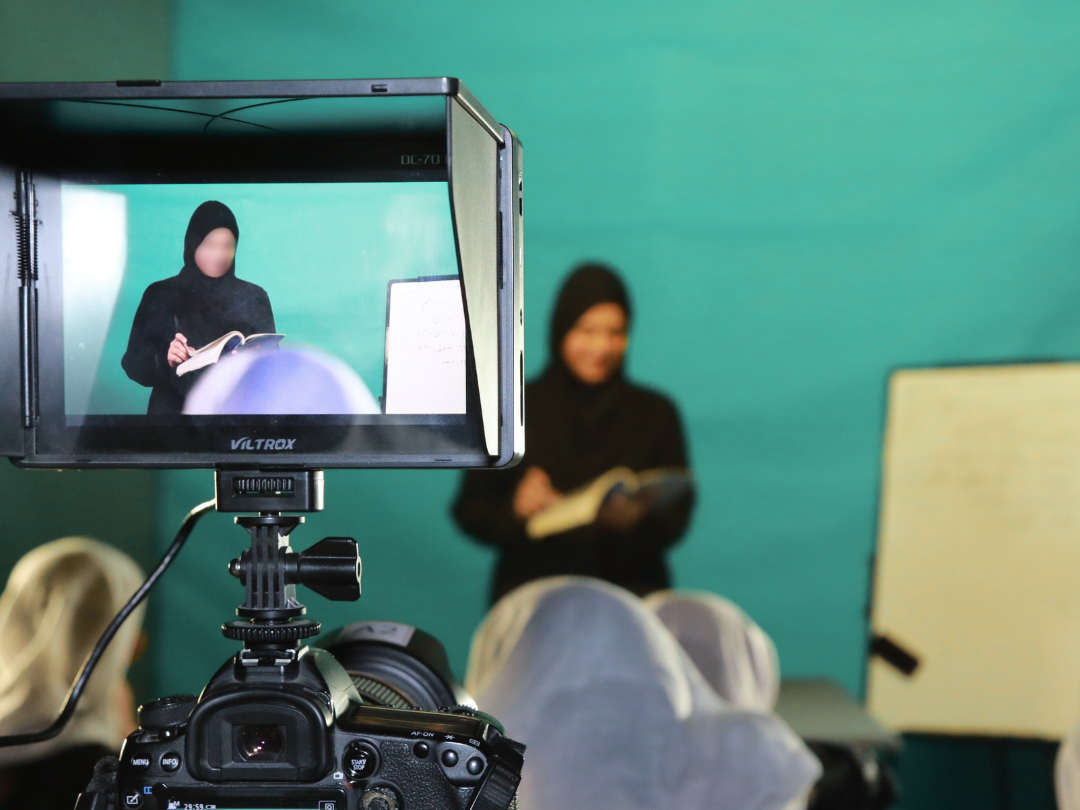
With their Malala Fund grant, Begum Organization for Women is launching a new satellite television channel to provide educational content for girls learning from home in Afghanistan.
With more than 20 years of experience in media and journalism, Afghan entrepreneur Hamida Aman got the idea to launch Radio Begum in 2020 as she watched Donald Trump’s administration begin peace negotiations with the Taliban in Doha, Qatar.
“It was the beginning of trouble for us. They were talking about everything except human rights, especially women’s rights,” Hamida recalls. “My fellows and I were very concerned. We wondered — what will happen to the little rights we managed to get in the last 20 years?”
The fear and anxiety around the future of women and girls’ rights in Afghanistan prompted Hamida to act. Anticipating the worst, she brainstormed ways for women to come together in case the Taliban came to power and increased restrictions on women’s rights. She created the Begum Organization for Women (BOW) and launched Radio Begum to share content on women’s rights and empowerment. Today, Radio Begum broadcasts 24/7, reaching more than 19 provinces. It also broadcasts 7-12th grade content daily in Dari and Pashto for girls who are learning from home while they are banned from secondary education.
With their Malala Fund grant, BOW launched a new satellite television channel, Begum TV, to reach even more girls and support them in continuing their secondary education. The channel broadcasts Begum Academy video classes for 21 hours a day, allowing 50,000 girls without internet or smartphone access to access curriculum content. BOW is also developing an app to help girls access Begum Academy offline.
“It’s very key to have options, to be reactive and bypass all the censorship and restrictions,” Hamida says.
Hamida launched Radio Begum on International Women’s Day in March 2021 and had a few months to freely develop programmes with her team before the Taliban took over Afghanistan in August 2021. After the takeover, Radio Begum was the only media network dedicated to women’s issues that continued broadcasting in Afghanistan.
Once the Taliban started establishing their new regime, Radio Begum had to stop most of their entertainment programmes and apply new rules, including segregating women and men in their offices. With most of their programmes focused on listeners calling in and receiving psychological support, Radio Begum began encountering major challenges connecting with their audience.
“Our audience was very silent. Nobody contacted us,” Hamida recalls. “Everyone was frozen by fear.”
The new Taliban regime also increased scrutiny of BOW — to this day, the organisation’s staff constantly fear that Radio Begum will have to shut down. The women working on BOW’s educational programmes also fear the situation in Afghanistan will get worse for women and girls. Hamida urges the international community to put more pressure on the Taliban and not tolerate further restrictions on women.
With additional resources from Malala Fund to reach and support more students, Hamida wants to assure young Afghan women and girls that BOW is committed to their education despite the immense challenges they face.
